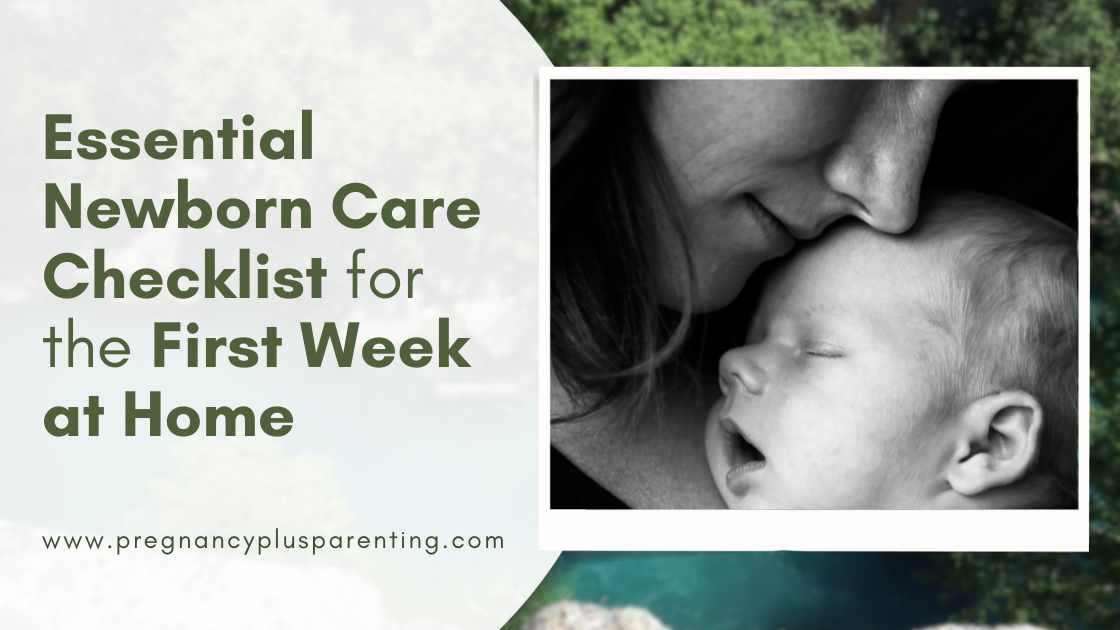Essential Newborn Care Checklist for the First Week at Home
Practical, gentle, and joyful guidance for new parents
Introduction
Bringing your newborn home is a moment filled with excitement, joy, and a touch of nervousness. The first week at home is a delicate period, where both parents and baby are adjusting to new routines, sleep patterns, and feeding schedules. It’s a time of immense learning, tender bonding, and creating a nurturing environment for your little one.
Having a newborn care checklist can make this first week less overwhelming, ensuring that all essential tasks are covered while allowing parents to focus on bonding with their baby. From feeding and diapering to bathing and sleep, this article will guide you through everything you need to know during those precious early days.
1. Feeding Your Newborn
Feeding is the cornerstone of newborn care. Whether you choose breastfeeding, formula feeding, or a combination, understanding your baby’s needs is essential.
Breastfeeding Tips:
-
Feed on demand, usually every 2–3 hours.
-
Watch for hunger cues: rooting, sucking on hands, or fussiness.
-
Ensure a proper latch to avoid soreness and ensure effective feeding.
-
Keep hydrated and rest when possible to support milk supply.
Formula Feeding Tips:
-
Follow recommended feeding volumes based on age and weight.
-
Ensure bottles, nipples, and formula are sterilized and prepared according to instructions.
-
Hold baby upright during feeding and burp afterward to prevent discomfort.
Pro tip: Keep a feeding journal during the first week. It helps you track amounts, timing, and patterns, making it easier to anticipate your baby’s needs.
2. Diapering Essentials
Newborns go through many diapers each day, often 8–12 changes in the first week. A reliable diaper routine helps keep your baby comfortable and prevents rashes.
Diapering Checklist:
-
Have a stock of newborn diapers (disposable or cloth).
-
Keep wipes, cotton balls, or soft cloths handy.
-
Apply diaper cream to prevent irritation.
-
Wash hands thoroughly before and after each change.
Pro tip: Change diapers promptly after bowel movements and before long naps to keep baby comfortable and reduce the risk of diaper rash.
3. Bathing and Skin Care
Newborn skin is delicate and requires gentle care. The first week is often about sponge baths rather than full immersion.
Bathing Tips:
-
Use lukewarm water (around 37°C or 98°F).
-
Keep baths short (5–10 minutes).
-
Focus on cleaning the face, neck folds, diaper area, and scalp.
-
Use mild, fragrance-free baby soap sparingly.
Umbilical Cord Care:
-
Keep the stump dry and exposed as much as possible.
-
Fold diapers below the stump to prevent irritation.
-
Avoid soaking until the stump falls off naturally (usually 1–2 weeks).
Skin Care Tips:
-
Apply gentle baby lotion if skin appears dry.
-
Avoid adult products, fragrances, or harsh chemicals.
-
Check for any rashes or unusual discoloration and consult your pediatrician if needed.
4. Safe Sleep Practices
Sleep is crucial for both baby and parents. Newborns sleep 14–17 hours per day, but in short, frequent stretches.
Safe Sleep Guidelines:
-
Place baby on their back for every sleep.
-
Use a firm crib or bassinet with a fitted sheet.
-
Avoid loose blankets, pillows, toys, or bumpers.
-
Keep the baby’s sleep area in your room for at least six months.
Sleep Routine Tips:
-
Dim lights during nighttime sleep.
-
Use gentle white noise or lullabies to create a calming environment.
-
Watch for sleepy cues like yawning, rubbing eyes, or fussiness, and put baby to sleep promptly.
Pro tip: Avoid picking up the baby for every minor movement. Gentle patting or soothing in the crib helps them learn to self-soothe over time.
5. Clothing and Temperature Regulation
Newborns cannot regulate their body temperature efficiently. Keeping them comfortable is essential.
Clothing Checklist:
-
Onesies, sleepers, hats, and mittens.
-
Light layers to adjust to room temperature.
-
Socks or booties to keep feet warm.
Room Temperature:
-
Maintain a room temperature of 68–72°F (20–22°C).
-
Avoid overheating with too many blankets or heavy clothing.
Pro tip: Dress your baby in one more layer than you are wearing and check their neck or back for warmth to ensure comfort.
6. Bonding and Emotional Connection
The first week is a time of building attachment and trust. Bonding strengthens emotional and social development.
Bonding Activities:
-
Skin-to-skin contact promotes warmth, comfort, and breastfeeding success.
-
Talk, sing, or hum softly to your baby during wake periods.
-
Gentle massage stimulates circulation and relaxation.
-
Eye contact during feeding helps babies feel secure and connected.
Pro tip: Spend quiet, uninterrupted moments with your baby daily. Even 10–15 minutes of focused attention enhances emotional connection.
7. Health and Medical Care
The first week involves monitoring your newborn’s health closely.
Newborn Checks:
-
Monitor feeding frequency, output, and weight.
-
Observe for jaundice, rashes, or unusual behavior.
-
Check temperature and breathing patterns regularly.
Pediatrician Visits:
-
Schedule your first checkup within 3–5 days after birth, or as advised.
-
Keep a record of feeding, sleep, and diaper patterns to share with the pediatrician.
Pro tip: Trust your instincts. If your baby seems unusually lethargic, refuses to feed, or has persistent vomiting or fever, seek medical advice immediately.
8. Handling Crying and Comforting Your Baby
Crying is your baby’s primary way of communicating. Understanding why your baby cries helps soothe them effectively.
Common Reasons for Crying:
-
Hunger
-
Dirty diaper
-
Sleepiness or overstimulation
-
Discomfort due to temperature or clothing
Comforting Techniques:
-
Hold and rock gently
-
Offer a pacifier or allow sucking on fingers
-
Swaddle to provide a sense of security
-
Soft shushing, white noise, or gentle motion
Pro tip: Avoid overstimulation during the first week. Keep interactions calm, slow, and consistent.
9. Organizing a Newborn Care Station
Having a dedicated area for newborn care reduces stress and keeps essentials within reach.
Newborn Station Essentials:
-
Diapers, wipes, and diaper cream
-
Fresh clothing and swaddles
-
Feeding supplies (bottles, formula, breast pump, burp cloths)
-
Baby lotion, thermometer, nail clippers
Pro tip: Keep the station stocked and organized to save time and reduce interruptions during care.
10. Parental Self-Care
Caring for a newborn can be physically and emotionally exhausting. Your well-being is important for both you and your baby.
Self-Care Tips:
-
Sleep when your baby sleeps to recover energy.
-
Accept help from family or friends with chores, meals, or older children.
-
Stay hydrated and maintain a healthy diet.
-
Take short moments for breathing exercises or gentle stretches.
Pro tip: Parental mental health is as important as baby care. Don’t hesitate to seek support from healthcare professionals if feeling overwhelmed.
11. Milestones to Observe in the First Week
Even in the first week, there are small milestones worth noting.
-
Baby’s first feeding and successful latch
-
Baby’s initial reflexes: grasping, rooting, startle reflex
-
Response to voices and touch
-
Wet and dirty diaper patterns (signs of hydration and digestion)
Pro tip: Document milestones in a baby journal or app to track development and share with your pediatrician.
12. Creating a Routine for the First Week
While newborns are unpredictable, having a flexible routine can help parents anticipate needs and manage time effectively.
Suggested Routine:
-
Feeding: Every 2–3 hours on demand
-
Diapering: Before and after naps, and whenever needed
-
Sleep: Encourage safe sleep in a calm environment
-
Bonding: Short periods of skin-to-skin or interactive play
-
Parental rest: Naps and self-care interspersed with baby care
Pro tip: Flexibility is key. Each baby has unique rhythms, so adapt the routine accordingly.
Conclusion
The first week at home with your newborn is a period of immense joy, learning, and adaptation. Following a structured newborn care checklist ensures that parents can cover all essentials while prioritizing bonding and emotional connection.
From feeding and diapering to sleep, bathing, and parental self-care, this checklist provides practical guidance while acknowledging the unpredictability and beauty of newborn life.
Remember, there is no perfect parent or perfect schedule. Observing your baby, following cues, and responding with patience and love are the most important aspects of newborn care. By creating a safe, nurturing, and supportive environment, you are laying the foundation for healthy growth, development, and a lifelong bond with your child.
Cherish these early days—they pass quickly, and the memories you create now will last a lifetime.






